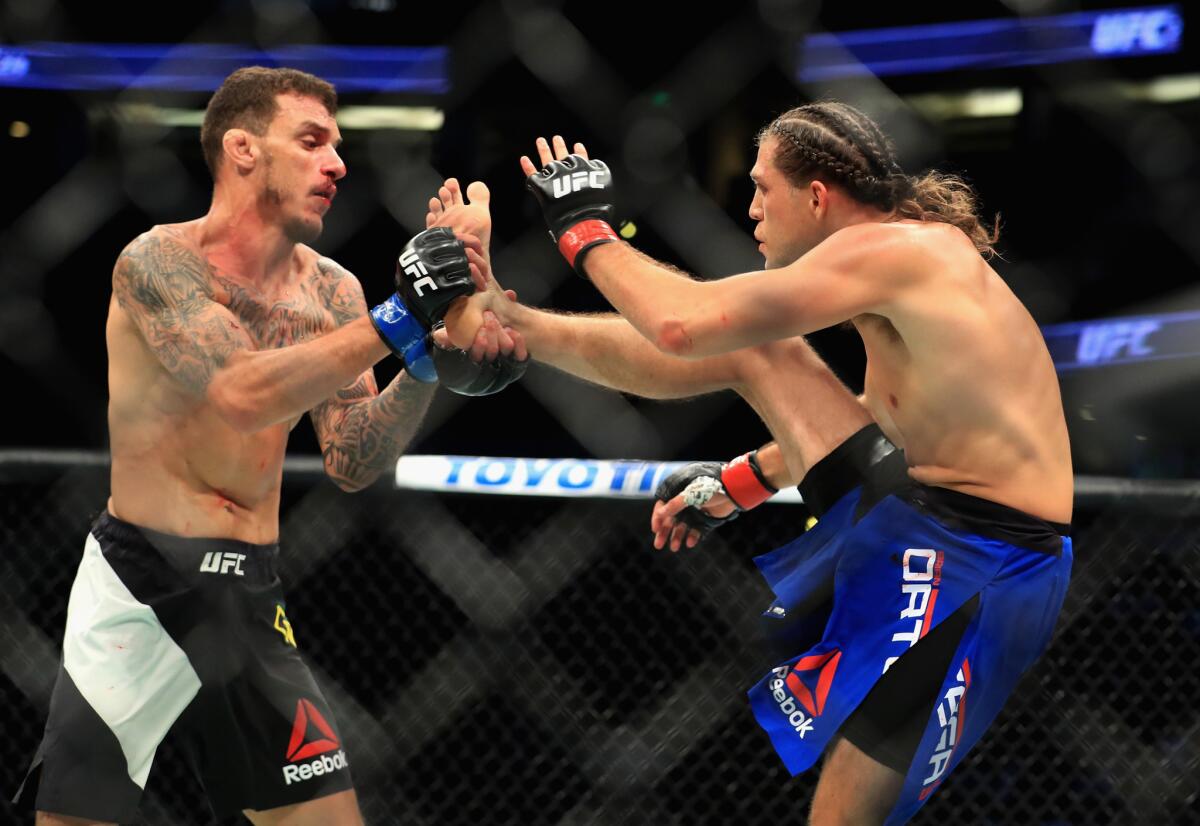L.A. garage fighter Brian Ortega has made it all the way to a UFC main event

- Share via
As the UFC has advanced to become a $4-billion industry, the number of underground street fighters who pepper the roster has decreased sharply.
One of the best exceptions is Brian Ortega, who has trained in boxing for several years inside a Harbor City garage.
“We call it the dungeon. For me, it works,” Ortega said. “A lot of people have these fancy facilities, these fancy training atmospheres, high-tech this and that. … I believe it’s about the fighter and how much work is he willing to put. I’m trying to show the world that I can make it happen from a garage. People don’t believe it, but I know how to work with what I’ve got to get to the top.”
Ortega (12-0) has climbed to the No. 6-rated UFC featherweight, and Saturday night at Fresno’s Save-Mart Arena, he reaches another pinnacle: his first main event (FS1, 7 p.m. Pacific). He meets Palm Springs’ No. 4-rated Cub Swanson (25-7), with the winner strongly positioned to become a candidate to fight champion Max Holloway next year.
Ortega is 4-0 in the UFC with two fight-of-the-night bonuses, two knockouts and two submissions.
“I keep training hard, keep working out, keep looking at my fights and I wonder, ‘If I was to fight me, how would I beat me?’ ” Ortega said. “It’s like having a boat with a bunch of holes. I’m trying to patch up all the holes. If I was to fight myself, I’d take advantage of certain things. I’ve got to know my opponent is thinking the same thing.”
Ortega, 26, always knew he wanted to be a fighter, a pursuit that caused great strife as he failed to stifle that yearning while going through high school.
Achieving a diploma was “a little, long round trip. … I wasn’t too liked in high school. I dropped out or got kicked out of four high schools. First high school, it was assaulting a teacher. Second, a fight. Third, a fight. And the last one was too much fighting so I just dropped out,” he said of leaving the Los Angeles Unified School District.
“I knew what I wanted to do with my life: I wanted to fight. But what I learned was you can’t just fight every person … or at least to do it somewhere where there’s no cameras around,” Ortega said.
The entertainment value of Ortega’s fights have boosted his rise, even though the long-term concern is he takes too many punches.
“I’m used to taking a hit. I’m not a point fighter. I go in there to bang or get the choke,” Ortega said. “Sometimes that’s good or bad. If it goes to points, that might be a problem, but I go in to try to finish. That’s the street fighter in me. We’re going to bang it out and I’m going to finish this fight no matter what.”
As for Swanson, Ortega says, “His weakness is my strength, jiujitsu submissions. I’m no stranger to the stand-up game. They can say I take hits, you know, but I don’t feel them. … When I’m in there, the adrenaline kicks in. I’ve been able to have a good chin against some of the best fighters, and I keep moving forward, without hesitation.”
More to Read
Go beyond the scoreboard
Get the latest on L.A.'s teams in the daily Sports Report newsletter.
You may occasionally receive promotional content from the Los Angeles Times.











